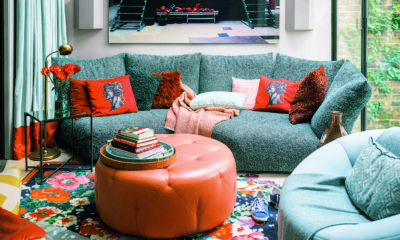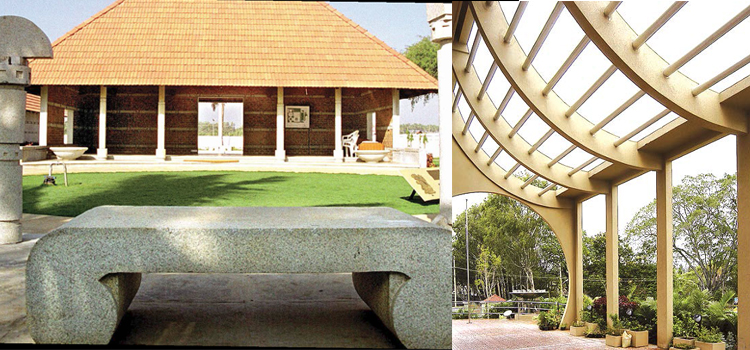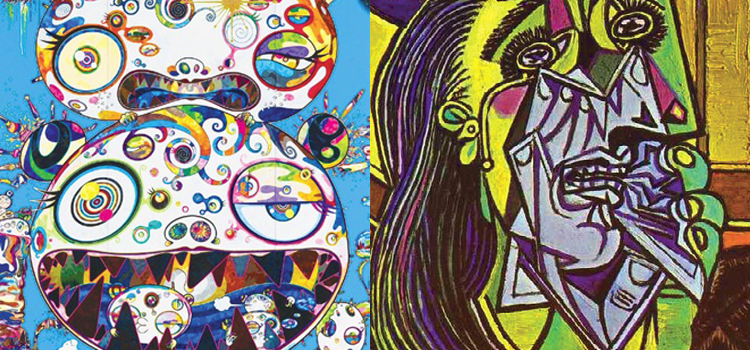Living
The Courtyard House Bengalaru
Abin Design sketches a natural Indian home in the heart of bustling Bengalaru
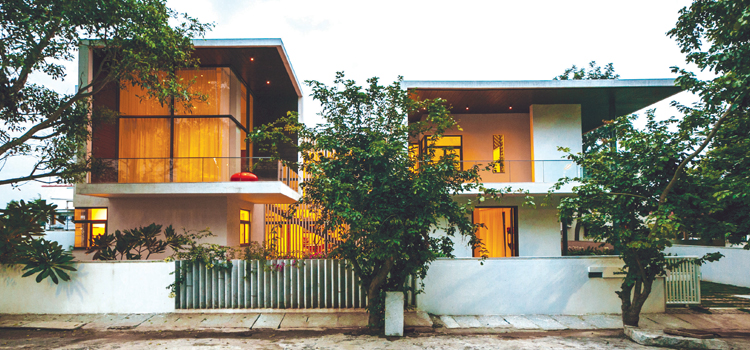
Abin Design sketches a natural Indian home in the heart of bustling Bengalaru
Rooted to the aesthetics of Indian architecture, there is a villa located in the heart of Bengaluru. Developed by Abin Design Studio for an NRI client, ‘The Courtyard House’ satiated a love for the ‘old’ in the middle of the ‘new’. ABS took up the challenge to draw out a plan that was vaastucompliant like the client wanted it, and a harmony between traditional and contemporary.
The Site
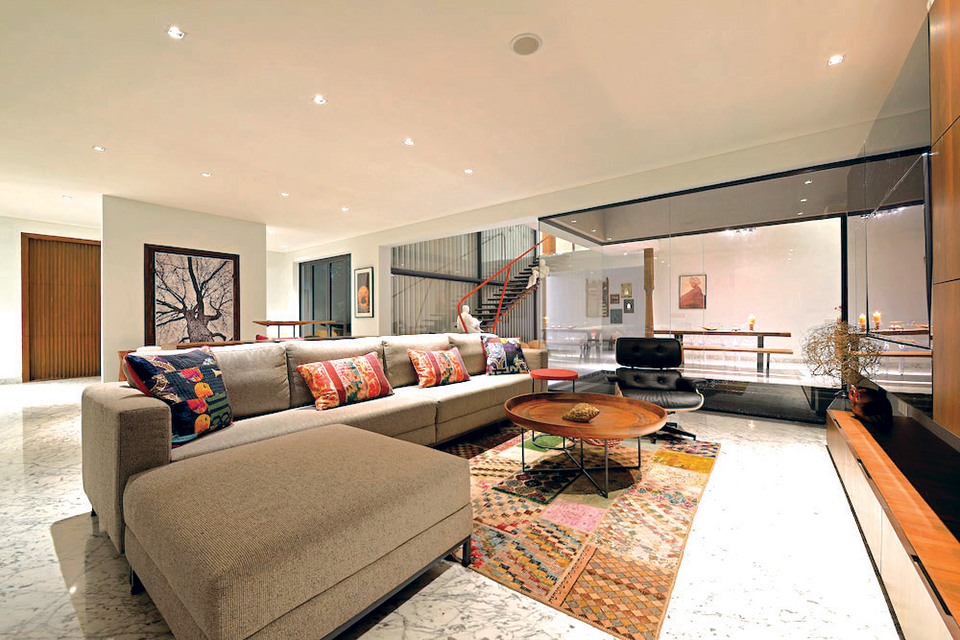
The site is part of a developed housing community in Bengaluru. The house located in modest surroundings stands out as a petal amongst thorns.
The Plan
Putting the pleasant weather of Bengaluru to maximum benefit, the design team used it to leverage light and space in house. In line with its name, the house has a courtyard, its most endearing character. It takes up the central point with the rest of the house surrounding it.
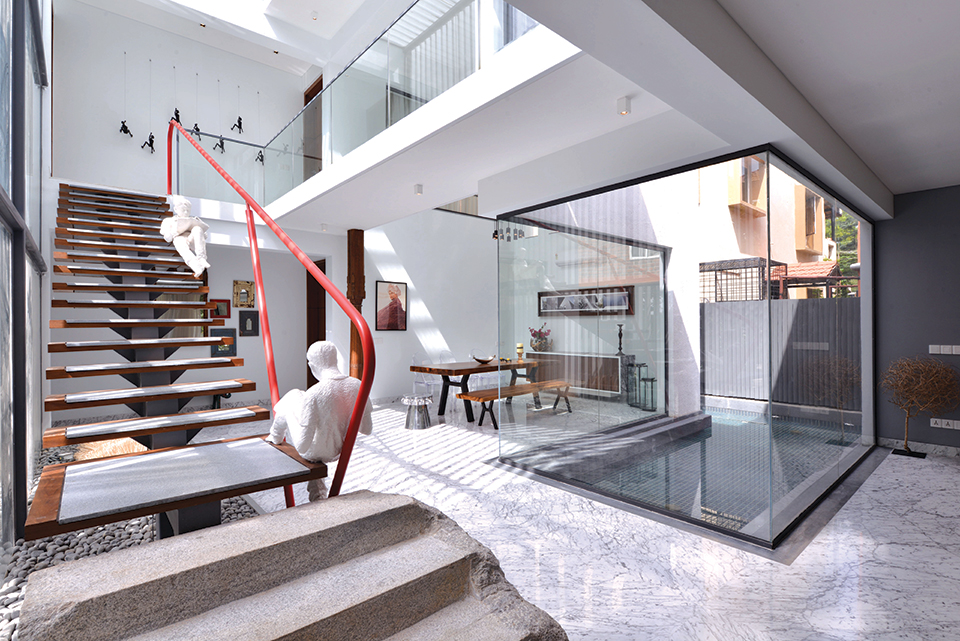
During the ideation stage the was an idea to erect a structure of tall mass on the south of the courtyard to make the open space shady. The northern side has a slightly shorter mass with an elongated slab exposed by virtue of balconies and terraces. With the contrast of forms, these two masses simply create a modern and intriguing form.
Space Alignment
A free flow of spaces inside and outside is the focus of the house. The living quarters look across a water court and flows to a spacious dining area, and further a glimpse of the master bedroom on the first floor. The indoors and outdoors are effortlessly merged in a combination of greens and blues, with elements of stone and glass.
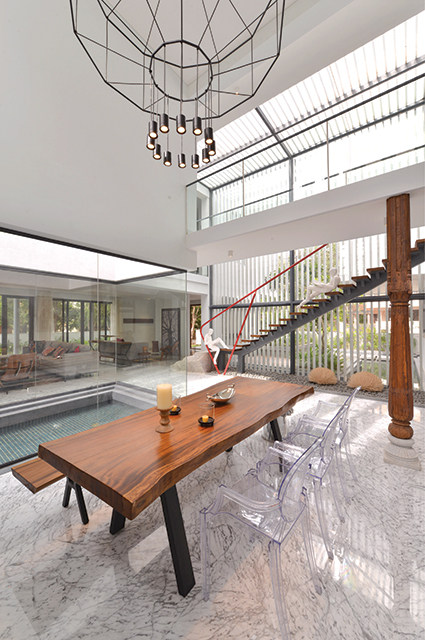
A design trick to be noted here is that each space in the house is designed as part of an entirety, which is cleverly put by subtle blurring of the edges of the disparate spaces. Green lawns, transparency among interior spaces, balconies, and the courtyard – all put together help create a perfect harmony between nature and space.
Interiors
The interiors are contemporary in style, yet harness tradition to reflect the client’s aesthetic requirements. The materials used display an effortless balance between modernity and tradition.
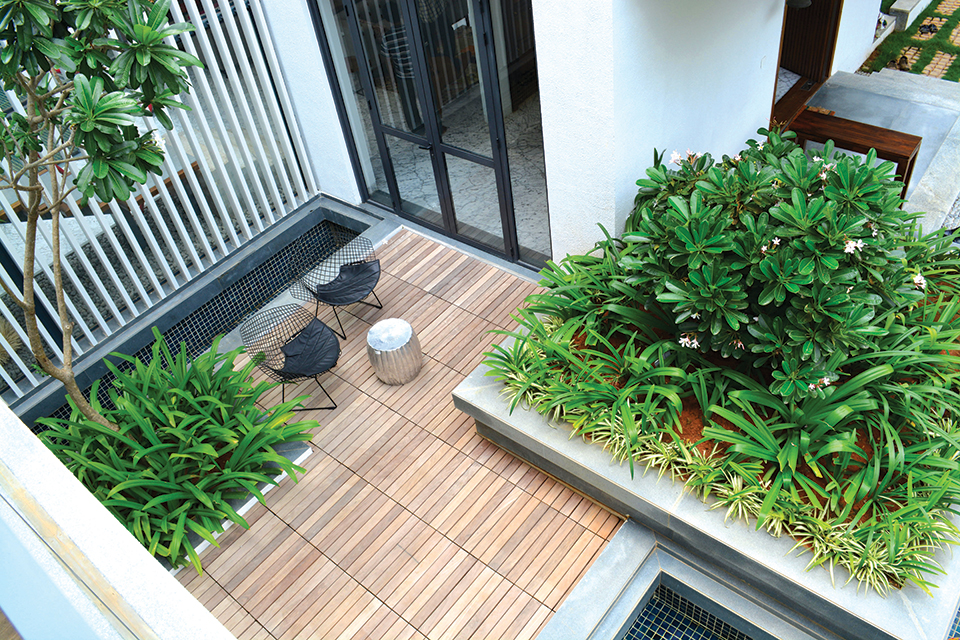
The entrance foyer was designed to merge into the living room and is demarcated only with a screen. An antique door opens into the home, which is accented with a beautiful antique bell hanging right next it. The staircase is designed with a concept of linking air to the soil. It features a granite base with steps carved onto it. This is set against a screen of slender vertical fins that allows ample skylight into the house. A remarkable red handrail and expressive sculptures add character to the staircase.

A delicately carved wooden pillar with appropriate proportions- is fixed onto a carved granite base along the dining room. It gives spirit and personality to space while the modernity of transparent acrylic chairs and a large wire-frame chandelier complement its traditional feel.
Furniture
Black seamless mirrored units are combined with hand-carved wooden tables and sleek console tables with folk-inspired rugs, as well as minimalist sofas with graphic art printed cushions. The house is an oasis in the concrete jungle.
Words by Pooja Sanchal Phtotographs from Various Sources
Art
Navratri 2024: Celebrating the Nine Colours and Their Significance
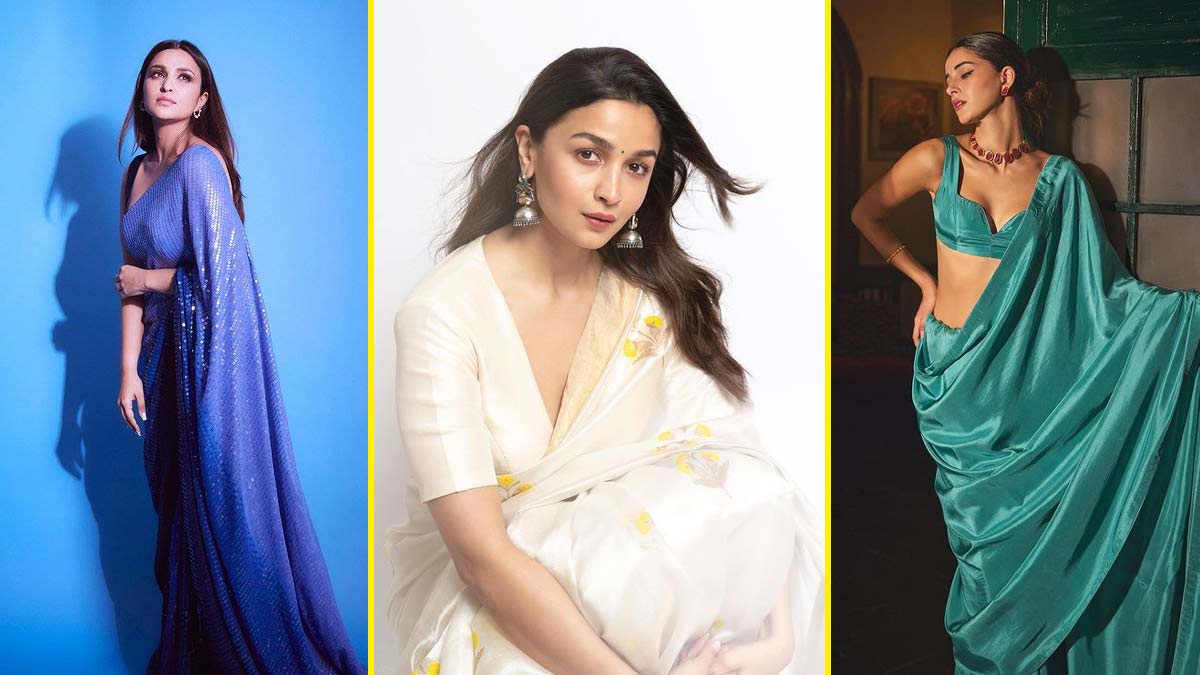
Navratri, the festival that spans nine nights, is one of the most auspicious and widely celebrated festivals in India. Dedicated to the worship of Goddess Durga in her nine forms, each day of Navratri holds special significance, marked by a distinct color that carries deep spiritual and cultural meaning. As we prepare for Navratri 2024, let’s explore the nine colors associated with each day, their significance, and how they inspire devotion, positivity, and harmony.
Day 1: Yellow
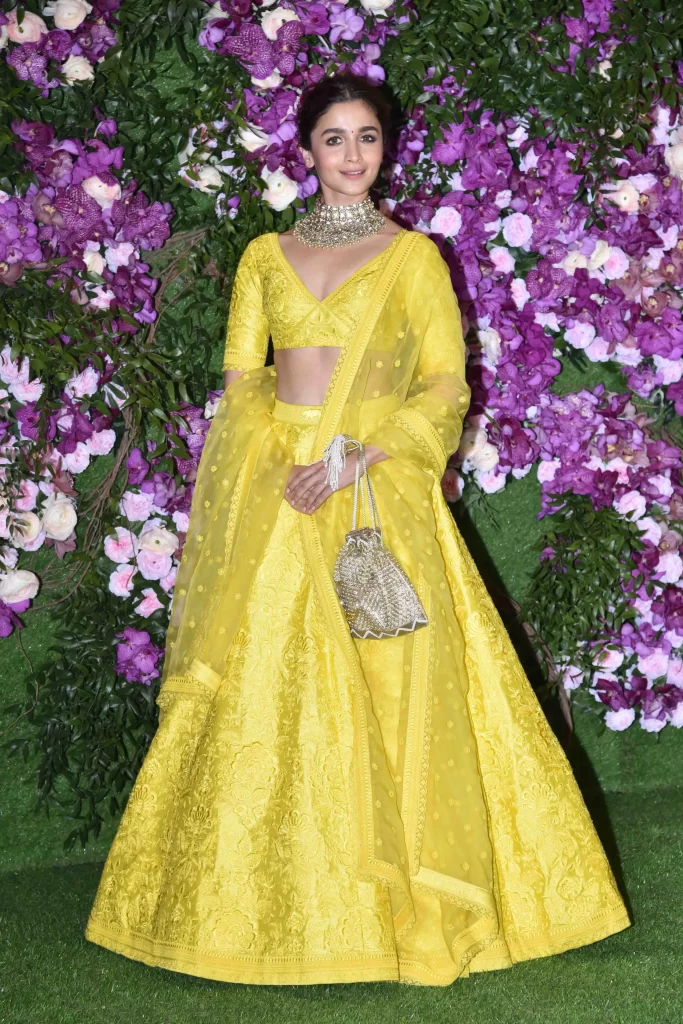
On Thursday, embrace the uplifting energy of yellow as you celebrate Navratri with optimism and joy. This warm and cheerful color symbolizes happiness and radiates positivity, keeping you in high spirits throughout the day.
Day 2: Green
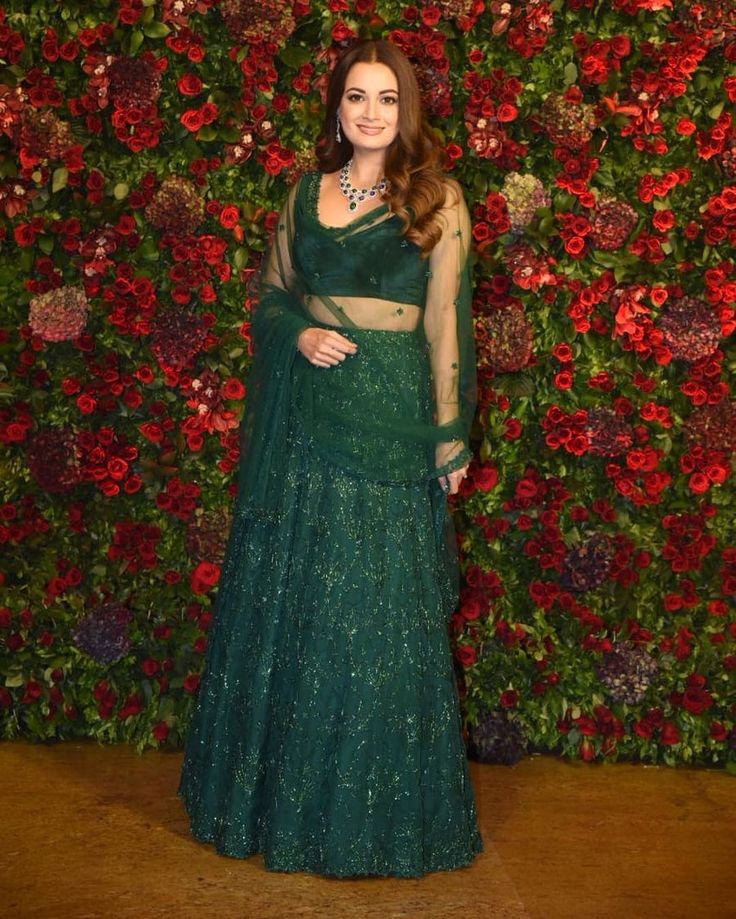
On Friday, wear green, a color that represents nature, growth, and harmony. It evokes a sense of peace and serenity, while also symbolizing new beginnings. Let the vibrant energy of green invite tranquility and the blessings of the Goddess into your life.
Day 3: Grey
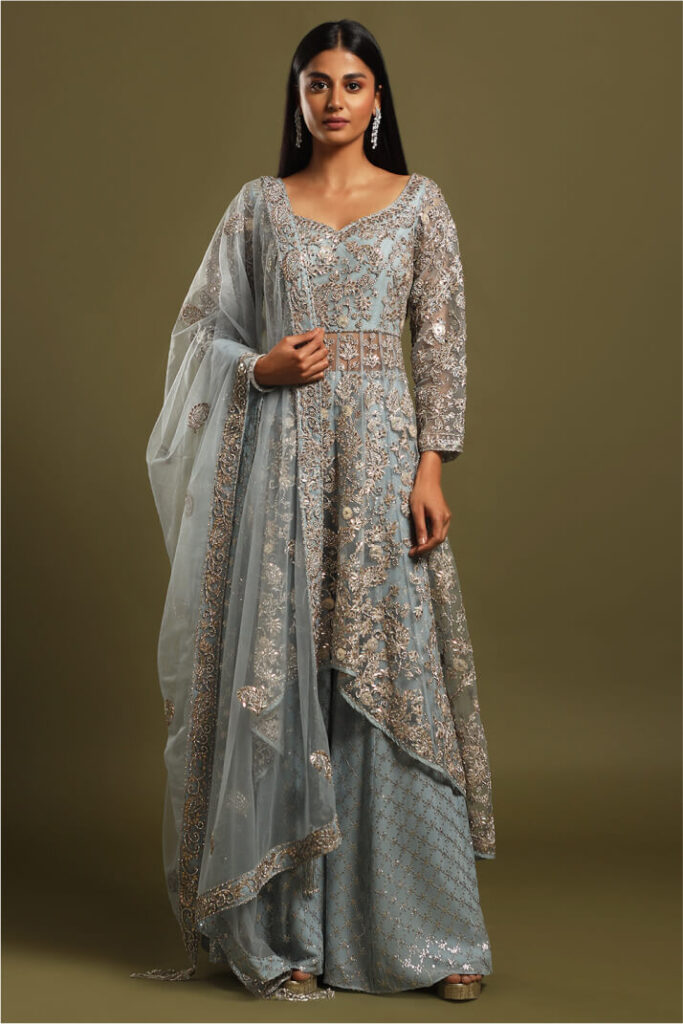
Saturday calls for the subtle sophistication of grey. This balanced color keeps you grounded and calm, symbolizing composure and understated elegance. It’s perfect for those who want to participate in Navratri with grace while making a refined style statement.
Day 4: Orange

On Sunday, adorn yourself in the vibrant hue of orange. This color embodies warmth, exuberance, and positivity. Wearing orange during Navratri invokes an upbeat energy, bringing vitality and a lively spirit to your celebrations.
Day 5: White
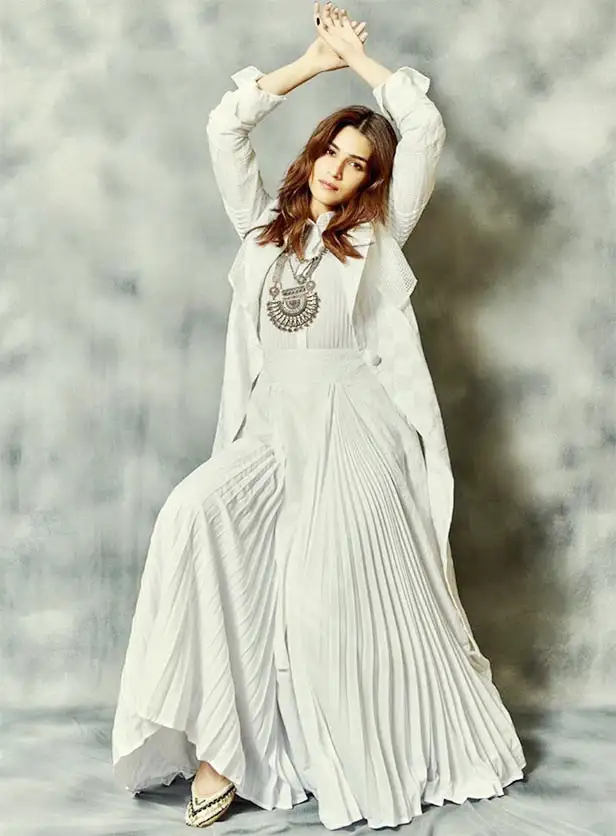
Start your Monday with the purity and serenity of white. Associated with innocence and spiritual clarity, this color invites inner peace and helps you connect with the divine blessings of the Goddess, offering a sense of security and calm.
Day 6: Red
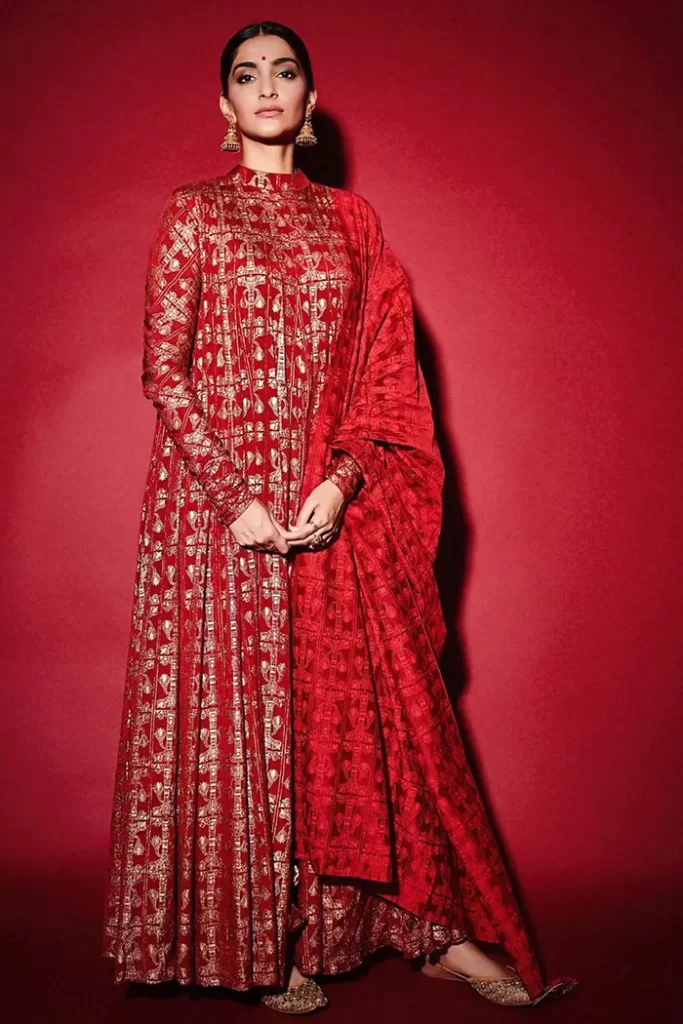
On Tuesday, red takes center stage, symbolizing passion, love, and strength. As one of the most auspicious colors, red is often offered to the Goddess in the form of a Chunri. Wearing red fills you with energy, vigor, and the vibrant spirit of Navratri.
Day 7: Royal Blue
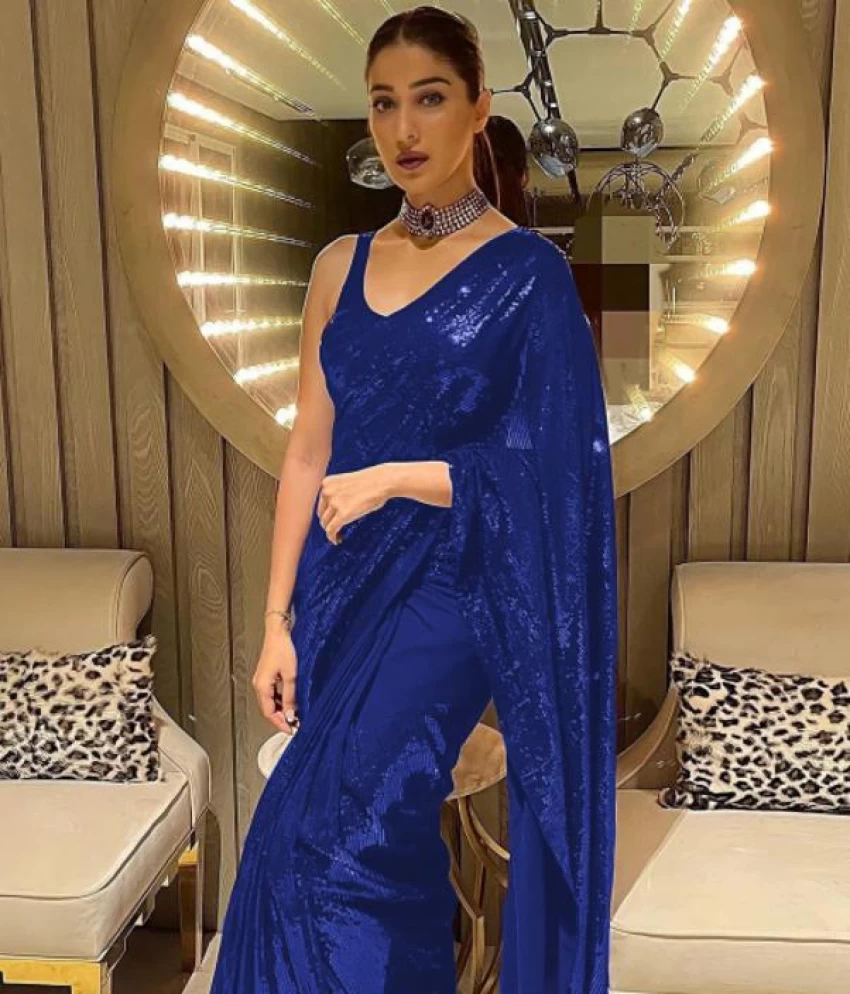
Wednesday’s color is royal blue, representing elegance, richness, and tranquility. This deep, vivid shade of blue exudes confidence and sophistication, making it an ideal choice for those who want to celebrate Navratri with style and grace.
Day 8: Pink
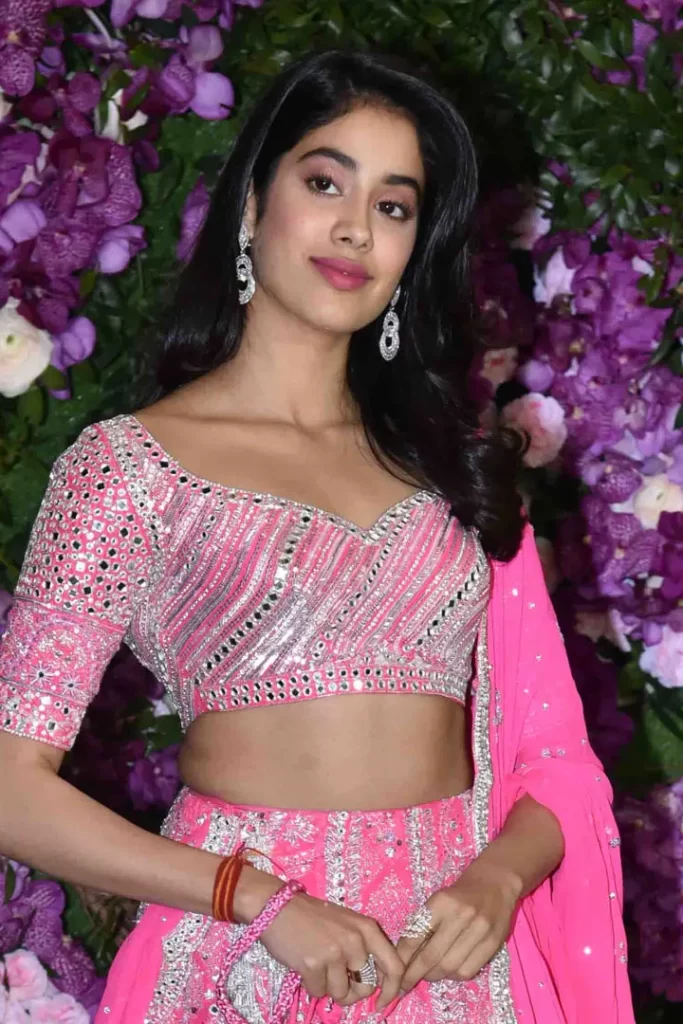
On Thursday, don the charming hue of pink, a symbol of universal love, affection, and harmony. Pink is a color that adds a soft touch of warmth and approachability, making it perfect for creating a loving and joyful atmosphere during the festivities.
Day 9: Purple
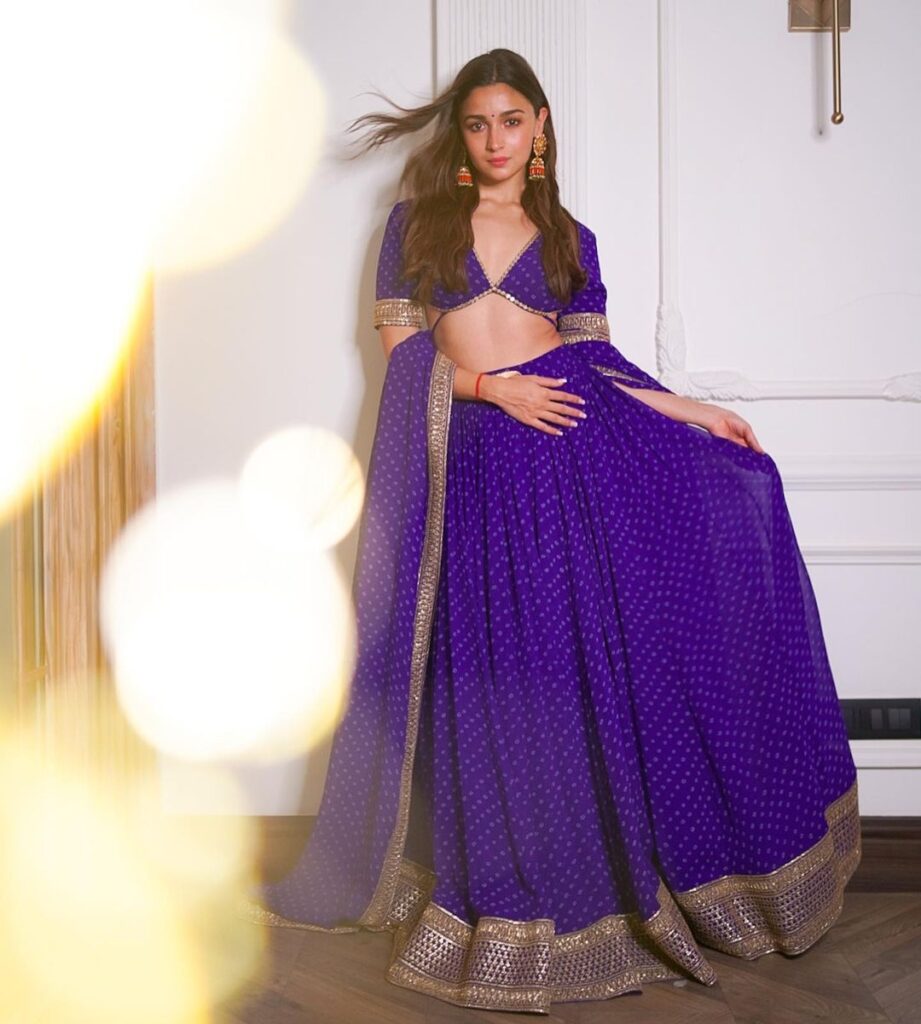
On the final day of Navratri, purple takes the spotlight. Associated with luxury, nobility, and grandeur, purple invites opulence into your life. Wearing this regal color while worshipping Navdurga bestows blessings of prosperity and richness, making it the perfect way to end your Navratri celebrations.
Luxury
Cartier’s New High Jewellery Collection is a Love For The Wild

In 2021, the American Museum of Natural History in New York presented Beautiful Creatures, an exhibition showcasing some of the most eccentric jewellery designs of the past century. One standout piece was the iconic crocodile necklace of Mexican actress María Félix, a loyal Cartier patron. Félix, renowned for her bold sense of style, famously strolled into Cartier’s Paris store in 1975 with her pet crocodile, requesting a necklace in its likeness. Cartier delivered, crafting two intertwined crocodiles encrusted with over a thousand emeralds and yellow diamonds. For Félix, crocodiles symbolized freedom, an embodiment of the spirit she associated with Mexico’s Golden Age of cinema.
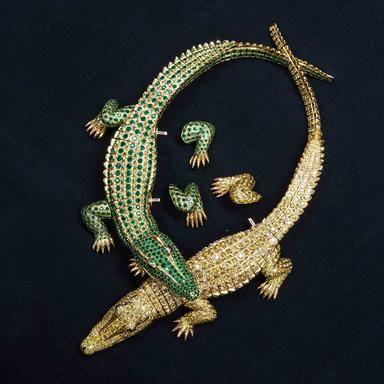
Fast forward to today, and Félix’s wildest dreams seem to have come to life at Cartier’s latest high jewellery collection, Nature Sauvage, previewed at the historic Kursalon Hübner gallery in Vienna. Among the star pieces is the Koaga necklace, a masterful creation where a zebra clasps an emerald-cut diamond and a 6.25-carat pear-shaped rubellite in its mouth. The zebra’s form is exquisitely rendered in alternating onyx stripes and pavé diamonds, making the creature feel almost lifelike.
The relationship between animals and jewellery has deep mythological roots, often glorified through rituals and symbolism. In ancient Egypt, scarab beetles were worn as earrings to signify respect for life’s cyclical nature. Meanwhile, in Hellenistic Greece, gods and goddesses took on the forms of winged creatures in adornment. So, what is it about animal-themed jewellery that continues to captivate us? According to Amanda Triossi, a jewellery historian based in Rome, the allure lies in our primal instincts: “Wearing wild animals like panthers or tigers gives one the sense of having conquered them. It’s empowering, as if you inherit the animal’s strength and attributes.”

Cartier captures this essence beautifully in its Amphista necklace. Featuring two intertwined snakes with diamond scales set with emeralds, their heads adorned with kite-shaped diamonds, the necklace echoes ancient Chinese philosophy’s yin-yang balance. The pièce de résistance? Nine octagonal Colombian emeralds, weighing a total of 14.72 carats.
Triossi also notes that many historical heroes are often depicted draped in the skins of animals they’ve vanquished, a symbol of triumph. Today, jewellery transforms that symbol into something precious and eternal—animal skins reimagined in imperishable materials.
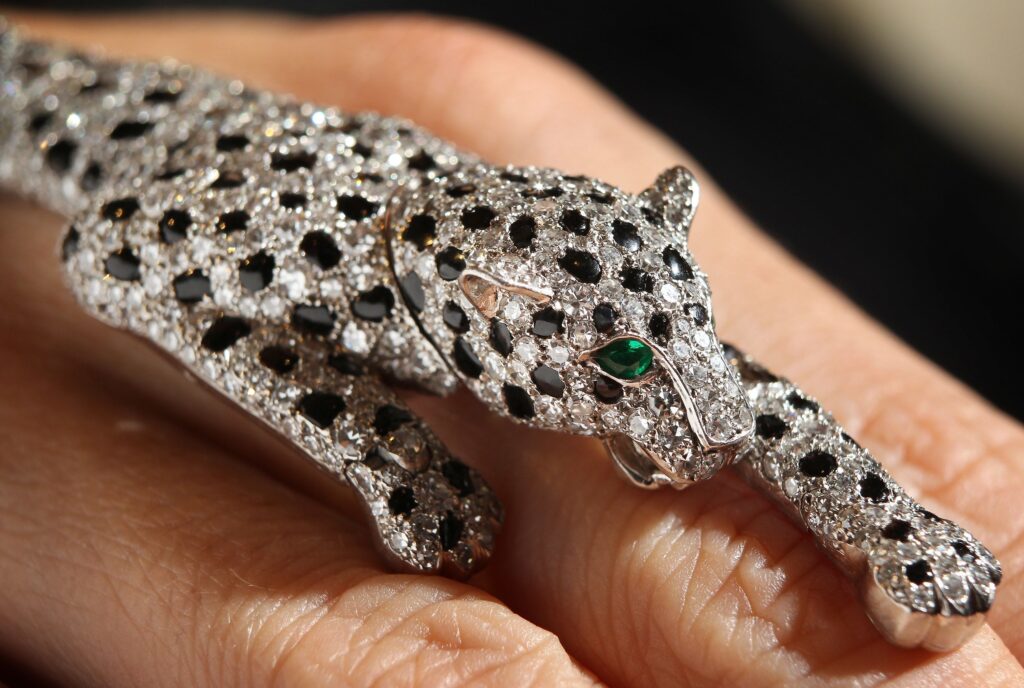
Later that evening, at a celebration held at Vienna’s Kunsthistorisches Museum, the largest in Austria, the enchantment of Cartier’s collection was heightened. The museum’s octagonal domes featured paintings of animals dancing with angels, setting the stage for a magical night. Guests were greeted by masterpieces such as Rembrandt’s Self-Portrait and Caravaggio’s Madonna of the Rosary, alongside Cartier page boys in their signature red hats. The evening’s soundtrack, a seamless blend of Bach and Kygo, was curated by DJ Gillian Sagansky, lending a modern twist to the classical ambiance.
The following day brought another cultural adventure—a visit to Otto Wagner’s Villa, a stunning summer palace designed by the famed architect. The paintings adorning the villa’s walls depicted animals in various forms—some caught in purgatory, others wandering the biblical bardo, with alligators restlessly emerging from swampy landscapes.
Luxury
Indian Craftsmanship Meets Italian Savoir Faire : Rahul Mishra x Tod’s
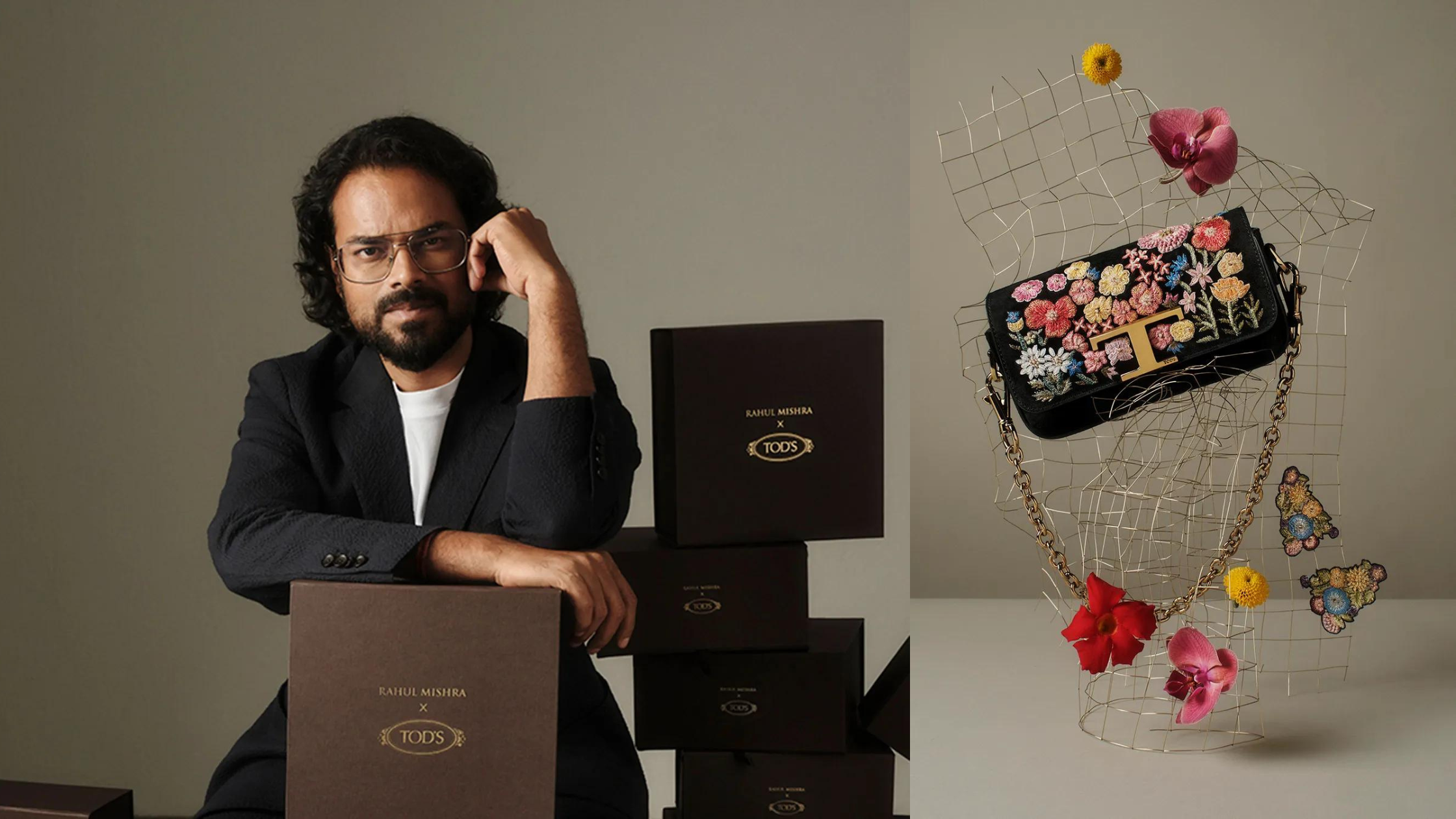
Quiet luxury was expected to dominate for a while, with many predicting that the return of bold, extravagant fashion would take its time. However, maximalism seems to be making a swift comeback, especially in the realm of designer collaborations. Hot on the heels of the vibrant, print-heavy H&M x Anamika Khanna collection, another limited-edition line has arrived, celebrating opulent luxury: Rahul Mishra x Tod’s.
As part of Tod’s T-Factory project, which features exclusive collaborations with creative innovators, this marks Indian couturier Rahul Mishra’s debut in the international accessories space.
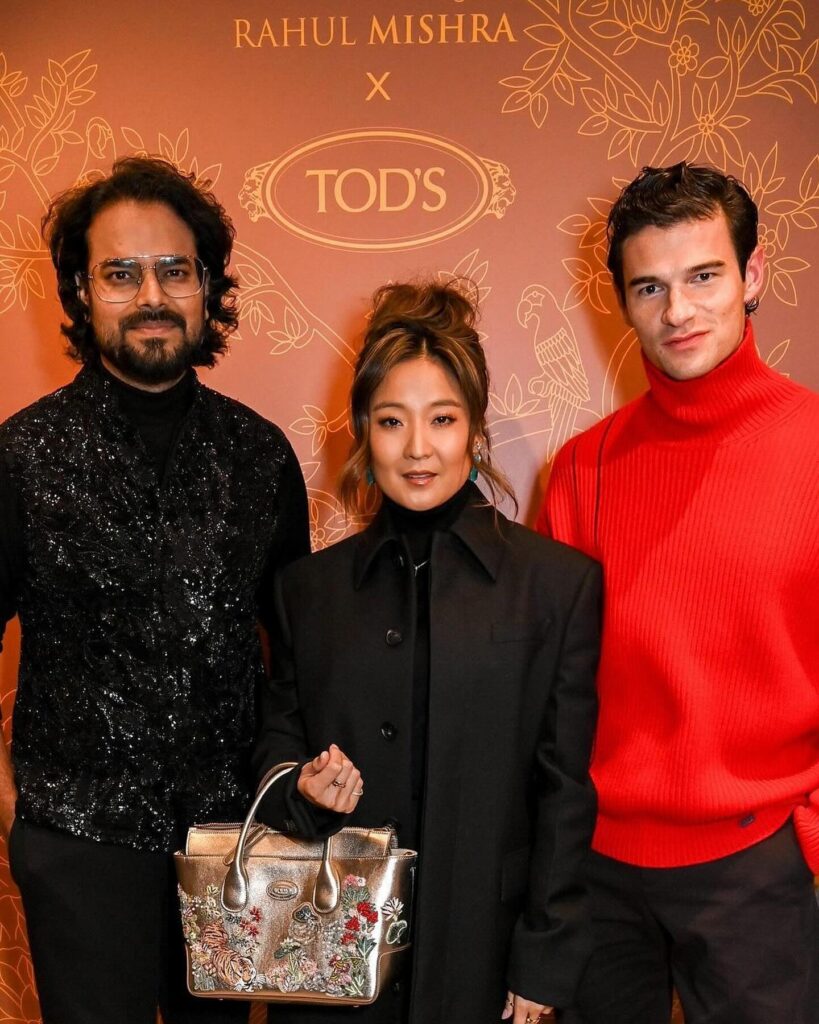
Mishra is a true ambassador of Indian design. Along with his wife Divya Mishra, he leads his eponymous label, which has brought the essence of India to the global stage in remarkable ways. A regular at Paris Fashion Week and the first Indian designer to showcase at Paris Haute Couture Week, his creations have adorned celebrities like Zendaya and Mark Zuckerberg, and have graced magazine covers in South Korea, China, and Europe. With such a path-defining legacy, it’s no surprise that Mishra and his visionary label were Tod’s natural choice for their first-ever Indian collaboration.
Mishra describes this collaboration as a beautiful fusion of “Italian craftsmanship serving as the canvas for Indian vision.” Tod’s iconic Gommino loafers and mules, along with the Di Bag and T Timeless shoulder bag, have been reimagined with intricate resham embroidery, crystals, and sequins—all meticulously hand-embroidered at Mishra’s atelier in Noida. “It was a technically challenging process that took time to perfect. I can confidently say these are some of the finest bags and shoes you’ll ever witness, in terms of craftsmanship and longevity. Such pieces are forever,” Mishra proudly shares.
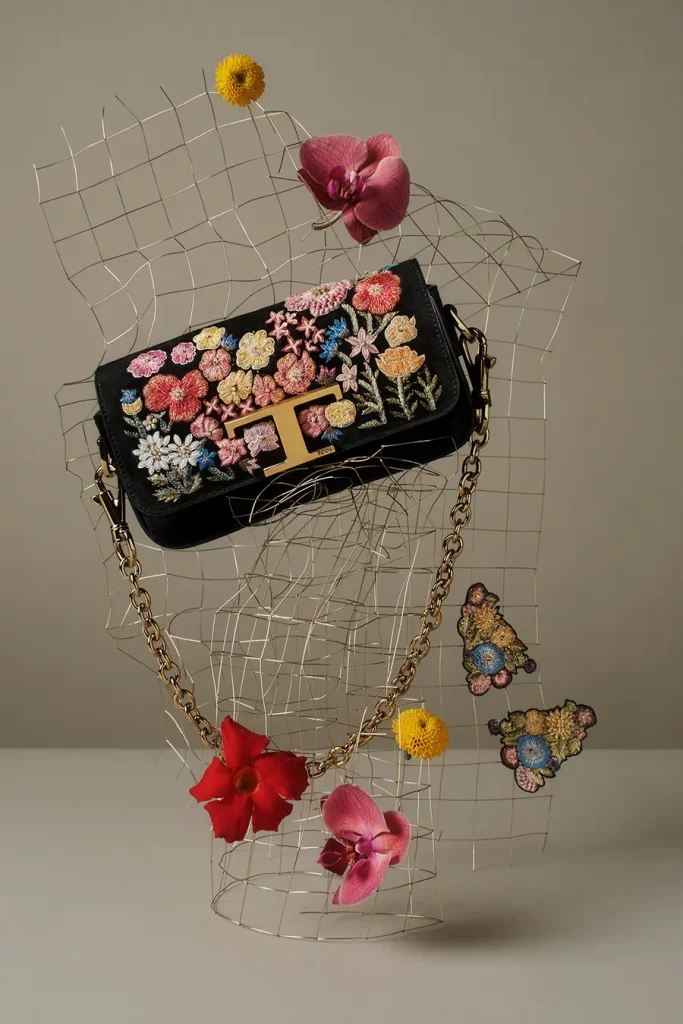
Crafted entirely between India and Italy, the limited-edition pieces from this collection are a true love letter to the artisanal heritage of both nations. “There’s a beauty in the teamwork here,” Mishra explains. “We received raw materials from Italy and worked on integrating our embroideries seamlessly into their leather. The pieces were then sent back to Tod’s, where they transformed them into stunning, three-dimensional products. In that sense, it’s been a genuine collaboration between Italy and India.”
Mishra firmly believes that the future of global design will be shaped by a global Indian aesthetic. “Just as French, Italian, British, and Japanese designs are now seen as universal,” he explains. This collaboration marks a significant step in advancing that narrative. “When you push the boundaries of ‘handmade in India’ to be respected at the pinnacle of luxury, everything else will naturally follow,” he emphasizes.
-
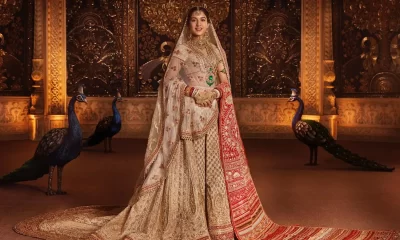
 Style11 months ago
Style11 months agoBridal Guide : Best Looks of Radhika Merchant Ambani
-
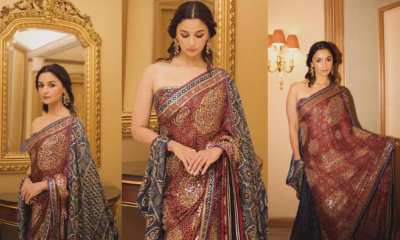
 Fashion1 year ago
Fashion1 year agoMost Discussed Ajrakh Saree of Alia Bhatt
-
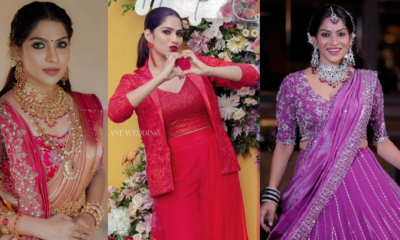
 Entertainment1 year ago
Entertainment1 year agoBridal Bliss : All Bridal Looks of Swasika Vijay
-

 Movies1 year ago
Movies1 year agoA Nostalgic Journey Through Love &Cinema : Best Bollywood Romantic 90s Movies
-
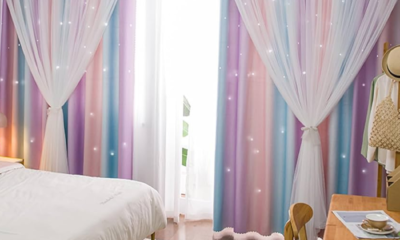
 AD8 months ago
AD8 months agoPopular Curtain Fabrics to Consider for Your Home
-
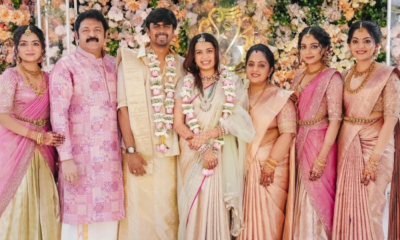
 Events9 months ago
Events9 months agoBest of Fashion Looks : Diya Krishna Wedding
-

 Events8 months ago
Events8 months agoThe L’Oréal Paris Show at Paris Fashion Week 2024
-

 news8 months ago
news8 months agoLaapataa Ladies: Kiran Rao’s Social Satire Becomes India’s Official Entry for the 2025 Oscars


